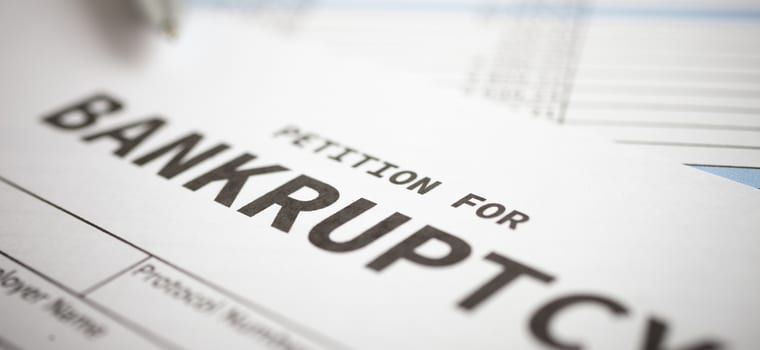Bankruptcy can be thought of as a financial lifeline for people who find themselves drowning in a sea of debt. It can provide people with a chance to legally satisfy part of the debt they owe and maybe even start over with a clean slate. However, once you file bankruptcy, hopes of a completely clean financial slate are likely years off in the future.
Here we’ll talk about the lengthy and sometimes complicated process of filing for bankruptcy and what may happen when you file your own.
What is Bankruptcy?
In short, bankruptcy is a legal proceeding that allows individuals to seek relief from their debts, either in part or in whole. Most often, the debtor — or person who owes the debts — is the one who files a petition with the court. The court reviews the person’s assets and liabilities to determine how best to proceed to pay the person’s outstanding debts.
Bankruptcies follow the rules outlined in the U.S. Bankruptcy Code with laws at the federal and state level.
What are the main types of bankruptcy for individuals?
Individual debtors typically follow one of two different kinds of bankruptcy: Chapter 7 or Chapter 13:
- Chapter 7: The most common type of bankruptcy for individuals, which allows you to eliminate most unsecured debts — credit cards, personal loans — by liquidating your assets.
- Chapter 13: The next most common type of bankruptcy for individuals. It involves a repayment plan to pay back some or all of your debts over three to five years. Monthly payments are made to a court trustee who, in turn, pays your creditors. At the end of the repayment plan, all remaining debts are discharged.
What Happens When You File for Bankruptcy?
When you’re unable to pay your debts as agreed, bankruptcy offers you the chance to satisfy a portion of your debts over time or have them completely wiped out. But what happens to your property, your credit, your job and your reputation when you file for bankruptcy? Keep reading to find out.
Will You Lose Your Property When You File for Bankruptcy?
Whether you will lose your property depends on what type of bankruptcy you file and what state you reside in.
- Chapter 7 Bankruptcy: If you file Chapter 7 bankruptcy — also known as liquidation bankruptcy — you may need to sell some of what you own to help pay off what you owe. Depending on the laws in your state, however, some assets may be exempt from liquidation, such as your home, car or retirement accounts.
- Chapter 13 Bankruptcy: If you file Chapter 13 bankruptcy, your debts will be reorganized and you’ll follow a payment plan over the next three to five years. So, you won’t have to worry about losing your property — as long as you follow the payment plan as agreed.
How Does Bankruptcy Affect Your Credit?
Declaring Chapter 7 or Chapter 13 bankruptcy means that you are unable to satisfy your debts as agreed, and either form can negatively impact your credit history. However, the length of time a bankruptcy will remain on your credit report depends on whether you file a Chapter 7 or Chapter 13 bankruptcy.
According to the Fair Credit Reporting Act:
- A Chapter 7 bankruptcy remains on your report for up to 10 years,
- A Chapter 13 bankruptcy remains on your credit report for up to seven years — or possibly more if you fail to meet certain conditions.
Individual accounts discharged in bankruptcy can be listed on your credit report as discharged or noted as being included in the bankruptcy, which lenders and creditors can see if they pull your credit report. Having bankruptcy noted on your credit report may cause you to have difficulty getting approved for credit or loans. However, there are some lenders that are willing to work with people who have filed bankruptcy in the past. But be aware that if you do get approved, less-than-favorable terms may apply.
One final thing to note is that the impact on your credit from bankruptcy won’t last forever. Over time, with positive, consistent credit behaviors, the bankruptcy’s impact should lessen.
Can Filing Bankruptcy Affect Your Job?
It depends on whether you are employed or seeking employment and whether it is a private or public employer.
For example, if you are employed when you file for bankruptcy, the U.S. Bankruptcy Code prohibits employers — whether public or private — from discriminating against you. In other words, your employer cannot fire you based on bankruptcy alone.
If you are seeking employment with a government agency, it is also prohibited by the U.S. Bankruptcy Code to refuse to hire you on the grounds that you filed for bankruptcy. The same goes for private companies, However, if you are looking for a position with a company that involves handling money, a private company may use your negative credit as a reason to deny you the position–just not the bankruptcy itself.
Are Bankruptcies Considered Public Record?
Yes, bankruptcies are considered public record. Records of bankruptcy proceedings are filed in the Public Access to Court Electronic Records system or PACER. Although the system is available to anyone who wants to access bankruptcy case information, it’s mostly used by creditors and attorneys.
Bankruptcies are sometimes published in the Public Notice section of newspapers, and they also may appear on your credit report.
The Bottom Line
When you have a significant amount of debt that outweighs the money you have available to pay for it, declaring bankruptcy may be the only way to legally deal with your debt and find relief.
The downside is that bankruptcy can negatively impact your credit for seven to 10 years, depending on what type of bankruptcy you file. But keep in mind that bankruptcy doesn’t last forever.




